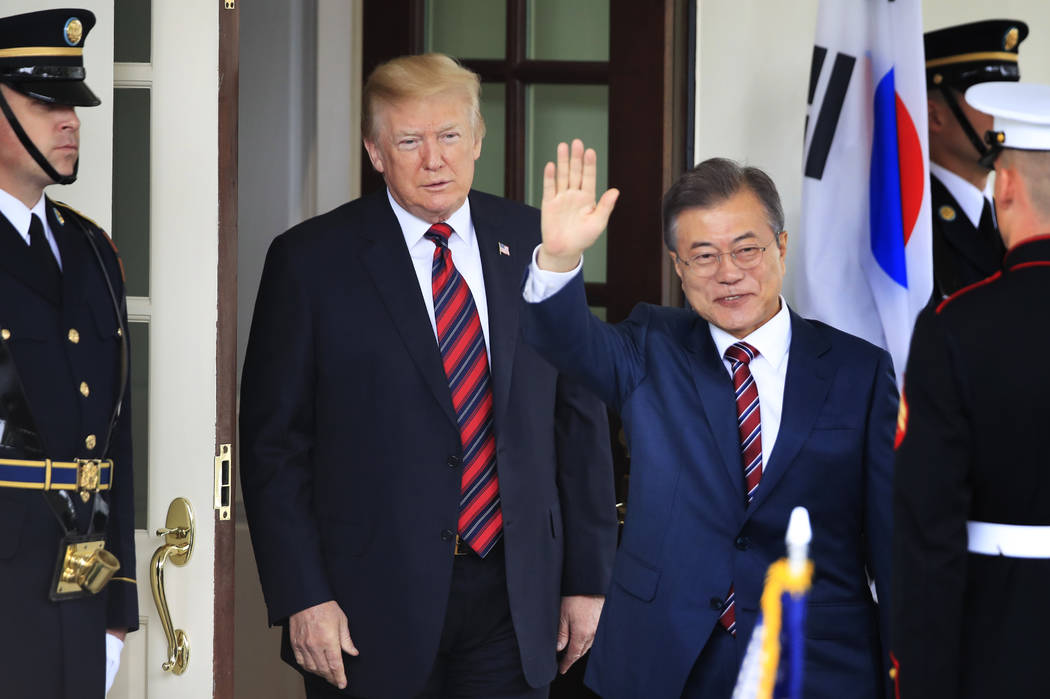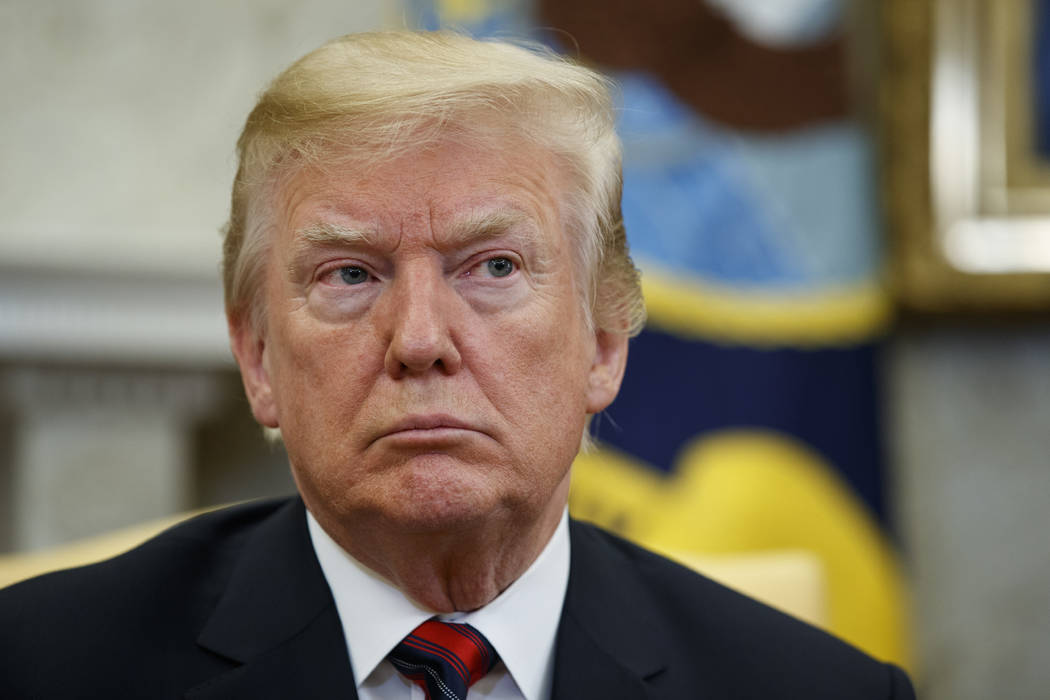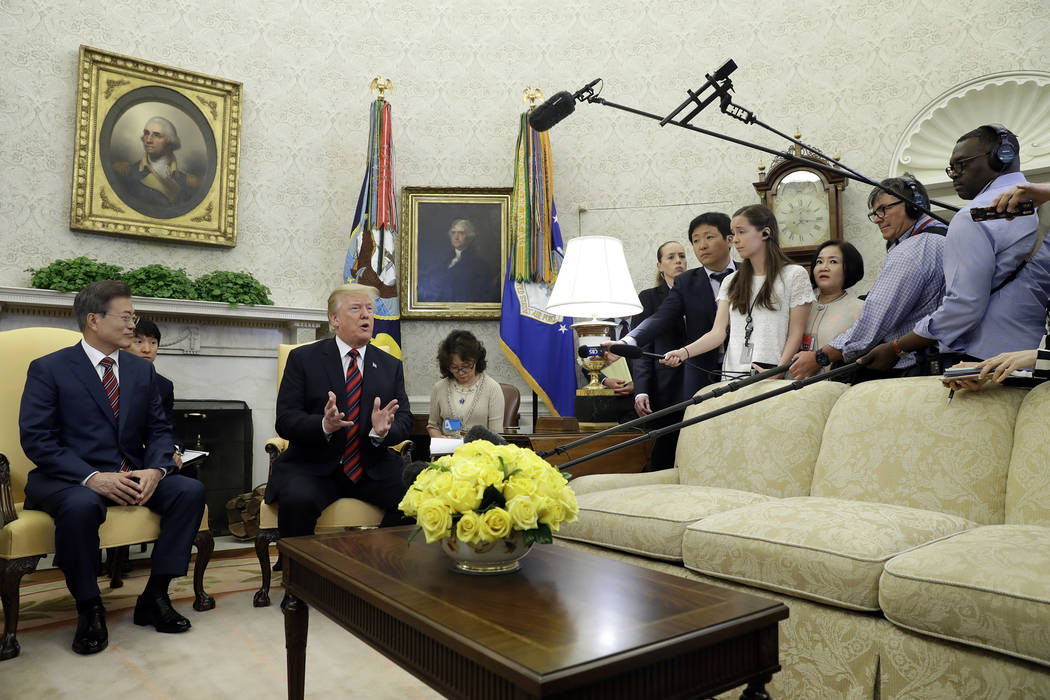Questions surround Trump-Kim summit after South Korean leader’s visit
WASHINGTON — South Korean President Moon Jae-in met with President Donald Trump on Tuesday amid speculation that the pending Singapore summit between Trump and North Korean strongman Kim Jong Un may not happen on June 12.
Shortly after noon, Moon arrived by car and met with Trump in the Oval Office before a working lunch. While South Korea’s national security adviser Chung Eli-Yong had told reporters Monday there was a “99.9 percent chance” the summit will occur, on Tuesday Trump answered reporters’ questions on the summit by saying, “It may not work out for June 12.”
If the summit doesn’t happen as planned, Trump added, “that’s OK too.”
It was the sixth meeting between Trump and Moon – one that was supposed to smooth the way for the first face-to-face meeting between an American president and the North Korean leader.
Later in the afternoon, Secretary of State Mike Pompeo told reporters that the administration is preparing for the summit in three weeks, but that doesn’t mean it will happen.
Pompeo has met with Kim twice since his confirmation. On his most recent trip, he returned with three Americans who had been incarcerated in North Korea.
Hostage coup boosts optimism
The return of three men who effectively had served as hostages was a diplomatic coup that led some in the administration to express hope that Trump and Kim could actually reach what has seemed like an impossible deal over the last two decades — “complete denuclearization of the Korean Peninsula,” as Kim and Moon termed it after a summit last month.
It was not that long ago that the two leaders had been engaged in furious name-calling – Trump called Kim “little Rocket Man” and Kim called Trump a “mentally-deranged U.S. dotard” – and yet, they had agreed to meet and talk.
Or will they?
Jenny Town, a Korean specialist with the nonprofit Stimson Center think tank, said she thinks the summit still will take place.
“I think it’s still on,” she said Tuesday. It’s a “made-for-TV summit process so there have to be twists and turns before the show.”
One moment of drama began with National Security Adviser John Bolton’s remarks on Sunday news shows when he offered the “Libya model” as a smart approach for denuclearization of the north.
Given a helpless Libyan leader Moammar Gadhafi’s violent death at the hands of rebels years later, Ellen Tauscher, a former undersecretary of State under President Barack Obama, saw Bolton’s language as extremely ill-considered.
Nuclear weapons, Tauscher offered, are “the biggest insurance policy (Kim) could have.” It was a mistake to mention Libya to a leader consumed with maintaining “regime survival.”
Town agreed. Bolton, she said, “is no longer a Fox News commentator so when he says these things it undermines the credibility of what Mike Pompeo is saying to the North Koreans directly.”
‘He will be safe’
Trump dangled carrots before Pyongyang as he sat with Moon. Asked if he would guarantee Kim’s safety, Trump responded, “Yes, we will guarantee his safety. And we’ve talked about that from the beginning. He will be safe. He will be happy. His country will be rich.”
Trump added that the United States spent “trillions of dollars” to turn South Korea into an economic powerhouse.
Bruce Klinger of the conservative Heritage Foundation is among those who believe “the White House had been a bit over-optimistic” about the chances of denuclearizing the Korean peninsula – given the very different views as to what the term means. North Koreans see denuclearization as “global arms control,” said Klinger, which means “they will go down to zero when everyone else goes down to zero.”
When a reporter asked Trump if denuclearization had to be “all in one,” Trump responded “It would certainly be better if it were all in one. Does it have to be? I don’t think I want to totally commit myself.”
National security experts have been stuck with the task of trying to decipher whether Trump said he would be willing to skip the summit as a matter of policy or a negotiating tool.
Whether Trump is signaling his willingness to skip Singapore to cut a better bargain or score a policy win, Klinger thinks a postponement of the summit, if one occurs, “could be good.” That way the U.S. team would have more time to prepare for the high-stakes tête-à-tête.
Contact Debra J. Saunders at dsaunders@reviewjournal.com or at 202-662-7391. Follow @DebraJSaunders on Twitter.
From White House pool spray Tuesday
Q President Trump, I'm a reporter from South Korea. If North Korea and Kim Jong-un decide CVID, will you literally guarantee the safety of the regime of North Korea?
PRESIDENT TRUMP: I will guarantee his safety. Yes, we will guarantee his safety. And we've talked about that from the beginning. He will be safe. He will be happy. His country will be rich. His country will be hardworking and very prosperous. They're very great people. They're hardworking, great people.

























